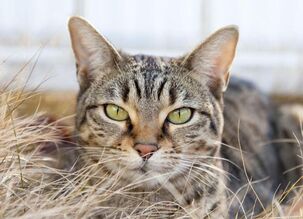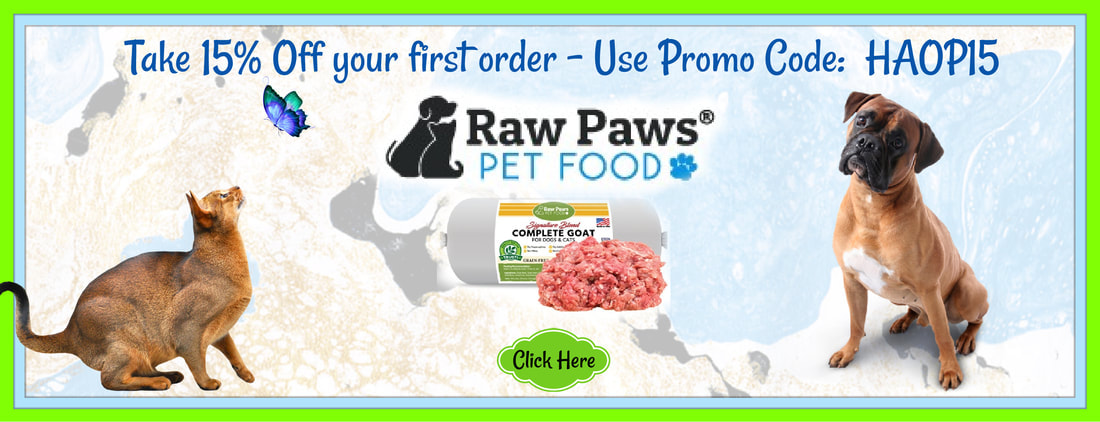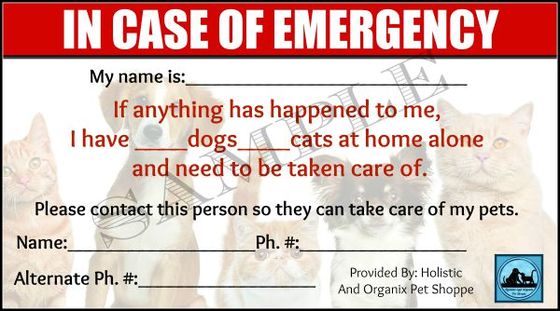Is Your Cat Suffering From this Persistent, Painful Bladder Problem?

Dr Karen Becker
'Feline Idiopathic Chronic Cystitis' is a big, long name for a very common condition in cats.
'Idiopathic' means of unknown origin – medical science doesn't know why the problem occurs. There's no identified single root cause for the condition. 'Chronic' means the problem is there consistently, or all the time. 'Cystitis' is inflammation of the bladder without the presence of infection.
Feline idiopathic chronic cystitis is also referred to by several other names, including:
'Feline Idiopathic Chronic Cystitis' is a big, long name for a very common condition in cats.
'Idiopathic' means of unknown origin – medical science doesn't know why the problem occurs. There's no identified single root cause for the condition. 'Chronic' means the problem is there consistently, or all the time. 'Cystitis' is inflammation of the bladder without the presence of infection.
Feline idiopathic chronic cystitis is also referred to by several other names, including:
- Feline lower urinary tract disease (FLUTD)
- Feline urologic syndrome (FUS)
- Painful bladder syndrome
- Feline interstitial cystitis
Typical Symptoms
No matter what name it goes by, there are common symptoms seen in all cats with feline idiopathic chronic cystitis, including:
There is straining while urinating. Most cats will be in and out of the litter box frequently in an effort to relieve themselves. They may void some urine with each visit to the box, but they don't feel they can completely empty their bladder in one trip.
The urinary tract is inflamed and irritated, so you might see blood in the urine. It can be either microscopic (meaning you won't see it but it's there, present on a urinalysis), or it can be macroscopic and you'll actually see blood in the litter box.
Cats with the condition are usually in pain, so your cat may cry while trying to urinate. This can be a really aggravating and intensely painful situation for your kitty.
Keep in mind all these symptoms are also typical of a urinary tract infection as well as crystals or bladder stones. It's important to realize if your cat is exhibiting symptoms of feline idiopathic chronic cystitis that you need to determine (with the help of your veterinarian) whether he has an infection or inflammation.
If he has an infection, the treatment will be entirely different from the treatment for bladder inflammation.
No matter what name it goes by, there are common symptoms seen in all cats with feline idiopathic chronic cystitis, including:
There is straining while urinating. Most cats will be in and out of the litter box frequently in an effort to relieve themselves. They may void some urine with each visit to the box, but they don't feel they can completely empty their bladder in one trip.
The urinary tract is inflamed and irritated, so you might see blood in the urine. It can be either microscopic (meaning you won't see it but it's there, present on a urinalysis), or it can be macroscopic and you'll actually see blood in the litter box.
Cats with the condition are usually in pain, so your cat may cry while trying to urinate. This can be a really aggravating and intensely painful situation for your kitty.
Keep in mind all these symptoms are also typical of a urinary tract infection as well as crystals or bladder stones. It's important to realize if your cat is exhibiting symptoms of feline idiopathic chronic cystitis that you need to determine (with the help of your veterinarian) whether he has an infection or inflammation.
If he has an infection, the treatment will be entirely different from the treatment for bladder inflammation.
Traditional Condition Management
Traditional veterinary medicine does a good job in many regards in managing feline idiopathic chronic cystitis.
The first goal is to increase the cat's water intake. Many kitties don't like to drink still water from a bowl, so some people leave a sink faucet dripping water to entice their cat to drink.
A better idea, in my opinion is a kitty water fountain or bubbler. Cats are attracted to moving or flowing water, so the recirculating water in a fountain should encourage more drinking. You can spend as little as $12 for one of these fountains all the way up to $100 for a deluxe version.
Another important goal of traditional veterinary medicine in managing feline bladder inflammation is to switch cats eating dry food to canned food, which has a much higher moisture content. Canned cat food contains between 70 and 80 percent water, while dry foods can have as little as 10 percent moisture content.
Feeding your cat only dry, dehydrated food can make her chronically dehydrated as well. Not only does a state of dehydration stress the kidneys, it produces a concentrated, potentially irritating mineral concentration in the bladder.
Traditional veterinary medicine does a good job in many regards in managing feline idiopathic chronic cystitis.
The first goal is to increase the cat's water intake. Many kitties don't like to drink still water from a bowl, so some people leave a sink faucet dripping water to entice their cat to drink.
A better idea, in my opinion is a kitty water fountain or bubbler. Cats are attracted to moving or flowing water, so the recirculating water in a fountain should encourage more drinking. You can spend as little as $12 for one of these fountains all the way up to $100 for a deluxe version.
Another important goal of traditional veterinary medicine in managing feline bladder inflammation is to switch cats eating dry food to canned food, which has a much higher moisture content. Canned cat food contains between 70 and 80 percent water, while dry foods can have as little as 10 percent moisture content.
Feeding your cat only dry, dehydrated food can make her chronically dehydrated as well. Not only does a state of dehydration stress the kidneys, it produces a concentrated, potentially irritating mineral concentration in the bladder.
Incorporating a Holistic Approach
Helping cats with feline idiopathic chronic cystitis drink more, urinate more, and eat a moisture-rich diet is one of the primary goals in traditional veterinary medicine.
There are also some holistically-oriented goals that are just as important, one of which is to reduce inflammation in the bodies of cats suffering from the condition.
Inflammation is produced from a number of different causes. Holistic vets generally focus on diet because we know there are foods that are pro-inflammatory and foods that are anti-inflammatory.
Pro-inflammatory foods create an inflammatory response in the body. For felines, a pro-inflammatory diet is one that is high in carbohydrates. A high carb diet creates inflammatory byproducts in your cat's body that can ultimately inflame the bladder.
Holistic vets focus on natural ways to control inflammation. There are oral anti-inflammatory medications and herbs that can help, but feeding an anti-inflammatory diet is the most important thing you can do to manage your pet's condition.
Helping cats with feline idiopathic chronic cystitis drink more, urinate more, and eat a moisture-rich diet is one of the primary goals in traditional veterinary medicine.
There are also some holistically-oriented goals that are just as important, one of which is to reduce inflammation in the bodies of cats suffering from the condition.
Inflammation is produced from a number of different causes. Holistic vets generally focus on diet because we know there are foods that are pro-inflammatory and foods that are anti-inflammatory.
Pro-inflammatory foods create an inflammatory response in the body. For felines, a pro-inflammatory diet is one that is high in carbohydrates. A high carb diet creates inflammatory byproducts in your cat's body that can ultimately inflame the bladder.
Holistic vets focus on natural ways to control inflammation. There are oral anti-inflammatory medications and herbs that can help, but feeding an anti-inflammatory diet is the most important thing you can do to manage your pet's condition.
So in addition to feeding canned food, I recommend you avoid foods with carbohydrates – particularly corn, wheat, rice and millet.
Another focus for holistic vets treating feline bladder inflammation is to identify potential sources of food allergies.
In my practice, I see a lot of idiopathic bladder inflammation. In about 50 percent of those cases, we see improvement simply by eliminating potentially allergenic foods from the cat's diet.
This usually means both chicken and seafood need to go. Your kitty needs a nice break from eating just one or two protein sources (typically chicken or seafood) for months or even years on end.
Cats have addictions when it comes to their food, so it can be quite a challenge to move them to a different protein source. In my practice, cats with chronic bladder inflammation are first transitioned from dry to canned food. The next step is a transition to a novel protein canned food – I use rabbit quite a bit for this purpose.
The goal is a minimum three-month break from chicken, seafood or whatever protein your kitty has been eating regularly. For about half my cat patients, there is a reduction in the amount of inflammation in their bladder just by making the switch away from food that is allergenic and pro-inflammatory.
Another focus for holistic vets treating feline bladder inflammation is to identify potential sources of food allergies.
In my practice, I see a lot of idiopathic bladder inflammation. In about 50 percent of those cases, we see improvement simply by eliminating potentially allergenic foods from the cat's diet.
This usually means both chicken and seafood need to go. Your kitty needs a nice break from eating just one or two protein sources (typically chicken or seafood) for months or even years on end.
Cats have addictions when it comes to their food, so it can be quite a challenge to move them to a different protein source. In my practice, cats with chronic bladder inflammation are first transitioned from dry to canned food. The next step is a transition to a novel protein canned food – I use rabbit quite a bit for this purpose.
The goal is a minimum three-month break from chicken, seafood or whatever protein your kitty has been eating regularly. For about half my cat patients, there is a reduction in the amount of inflammation in their bladder just by making the switch away from food that is allergenic and pro-inflammatory.
The Role of Stress in Bladder Inflammation
Another holistic focus is on the potential stressors in your cat's life.
I can't understate the role stress plays when it comes to an inflammatory condition with your kitty. All bodies break down at the weakest link. For cats, the weakest link tends to be the urinary tract and bladder.
Stressors also attack the body at its weakest link. Stress occurs from three different sources: environmental stress, immunologic stress and nutritional stress.
Environmental stress can be anything from a move to a new home, new living room furniture, the birth of a baby, a divorce, a child leaving home for college, or the addition of a new pet. All these things can create emotional stress in your cat. You may see no outward signs of it because cats tend to internalize their stress, but it's there and it can exacerbate an inflammatory condition.
If you have a situation of cat-to-cat aggression in your home – let's say you bring home a new kitty from a rescue organization – your cats may not be fighting overtly. But you can tell from their behavior and posture they're having negative interactions with one another. That's another source of stress that can bring on an episode of uncontrolled inflammation in your pet's body.
Depending on the environmental stressor, I might recommend a product like Feliway®, a calming pheromone spray for cats.
There are also some great homeopathic remedies available to decrease stress. My favorite is Aconitum. There are also the Bach Flower Remedies® and Rescue® Remedy, which I like a lot for helping to balance emotional disturbances in cats.
Environmental stressors should always be considered when you're trying to find potential causes for chronic bladder inflammation.
Another holistic focus is on the potential stressors in your cat's life.
I can't understate the role stress plays when it comes to an inflammatory condition with your kitty. All bodies break down at the weakest link. For cats, the weakest link tends to be the urinary tract and bladder.
Stressors also attack the body at its weakest link. Stress occurs from three different sources: environmental stress, immunologic stress and nutritional stress.
Environmental stress can be anything from a move to a new home, new living room furniture, the birth of a baby, a divorce, a child leaving home for college, or the addition of a new pet. All these things can create emotional stress in your cat. You may see no outward signs of it because cats tend to internalize their stress, but it's there and it can exacerbate an inflammatory condition.
If you have a situation of cat-to-cat aggression in your home – let's say you bring home a new kitty from a rescue organization – your cats may not be fighting overtly. But you can tell from their behavior and posture they're having negative interactions with one another. That's another source of stress that can bring on an episode of uncontrolled inflammation in your pet's body.
Depending on the environmental stressor, I might recommend a product like Feliway®, a calming pheromone spray for cats.
There are also some great homeopathic remedies available to decrease stress. My favorite is Aconitum. There are also the Bach Flower Remedies® and Rescue® Remedy, which I like a lot for helping to balance emotional disturbances in cats.
Environmental stressors should always be considered when you're trying to find potential causes for chronic bladder inflammation.
Immunologic stress is primarily a result of unnecessary vaccinations. If you have an indoor-only kitty, the risk of exposure to infectious diseases is almost non-existent, and unnecessary vaccines can put a tremendous amount of immunologic stress on your pet.
Nutritional stress is the result of poor quality, grain-based, rendered diets that contain additives, preservatives, and unnecessary levels of fats, salts and sugar. Transitioning your cat to a species-appropriate, grain-free diet will reduce nutritional stress. The optimum choice is raw food; second best is canned food.
Additional Therapies
There are several natural supplements you can use, working with your holistic vet, to reduce the amount of inflammation in your cat's bladder and throughout his body.
Research shows adding glucosamine to cat food helps reduce soft tissue inflammation. I prefer glucosamine sulfate. Many cats won't take glucosamine so we use Adequan, or polysulfated glycosaminoglycan – an injectible glucosamine. I have many kitty patients that do well on monthly injections of Adequan to help control chronic cystitis.
There are also some homeopathics that work well for recurrent bladder inflammation. I use Cantharis in my practice in addition to Aconitum to calm kitties that are having a stress-related flare up.
Nutritional stress is the result of poor quality, grain-based, rendered diets that contain additives, preservatives, and unnecessary levels of fats, salts and sugar. Transitioning your cat to a species-appropriate, grain-free diet will reduce nutritional stress. The optimum choice is raw food; second best is canned food.
Additional Therapies
There are several natural supplements you can use, working with your holistic vet, to reduce the amount of inflammation in your cat's bladder and throughout his body.
Research shows adding glucosamine to cat food helps reduce soft tissue inflammation. I prefer glucosamine sulfate. Many cats won't take glucosamine so we use Adequan, or polysulfated glycosaminoglycan – an injectible glucosamine. I have many kitty patients that do well on monthly injections of Adequan to help control chronic cystitis.
There are also some homeopathics that work well for recurrent bladder inflammation. I use Cantharis in my practice in addition to Aconitum to calm kitties that are having a stress-related flare up.
There are some terrific herbs, as well, that can be used to help moderate an inflammatory response in the bladder, including:
Acupuncture has been proven to do a great job managing cystitis in some cats.
And last but not least, there are natural anti-inflammatories you can consider adding to your cat's diet. In my practice, we use proteolytic enzymes as well as SpiruGreen, a super green food that can naturally decrease the amount of inflammation present in your cat's bladder.
Hopefully you'll be able to use one or a combination of these natural remedies to help manage your cat's idiopathic chronic cystitis. Remember to also address lifestyle, nutritional and immune-based stressors that have the potential to exacerbate your kitty's inflammatory condition.
- Berberis
- Hydrangea
- Eupatorium
Acupuncture has been proven to do a great job managing cystitis in some cats.
And last but not least, there are natural anti-inflammatories you can consider adding to your cat's diet. In my practice, we use proteolytic enzymes as well as SpiruGreen, a super green food that can naturally decrease the amount of inflammation present in your cat's bladder.
Hopefully you'll be able to use one or a combination of these natural remedies to help manage your cat's idiopathic chronic cystitis. Remember to also address lifestyle, nutritional and immune-based stressors that have the potential to exacerbate your kitty's inflammatory condition.



















